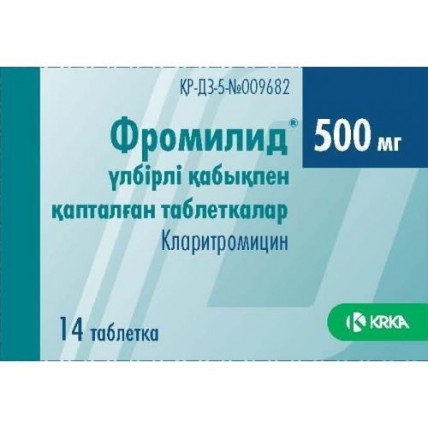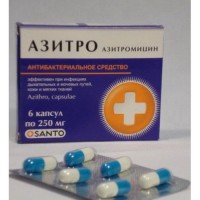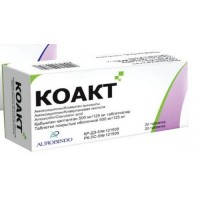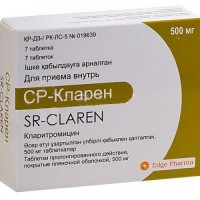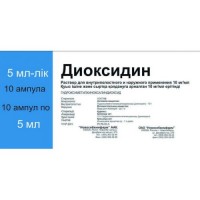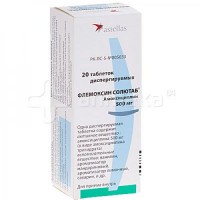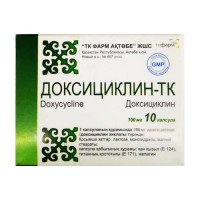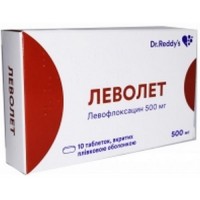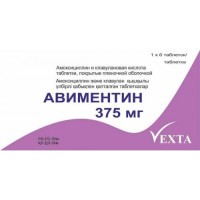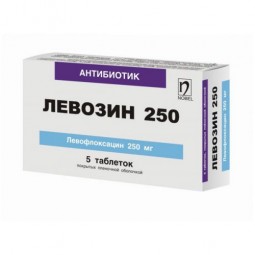Fromilid 500 mg (14 tablets)
- $31.40
The instruction for medical use
of FROMILID® medicine
the Trade name
of Fromilid®
the International unlicensed
name Klaritromitsin Lekarstvennaya
the Tablet form, film coated 250 mg and 500 mg
Structure
One tablet contains
active agent – klaritromitsin 250 mg or 500 mg,
excipients: corn starch, cellulose microcrystalline 101, cellulose microcrystalline 102, silicon dioxide colloidal anhydrous, starch prezhelatinizirovanny, potassium polakrilin, talc, magnesium stearate,
structure of a cover: gipromelloza of 6 cps, talc, ferrous oxide yellow (E172), propylene glycol, titan dioxide (E171).
The description
of the Tablet, film coated light brownish-yellow color, oval, with a biconvex surface.
Pharmacotherapeutic group
Antimicrobial drugs for system use. Macroleads.
The code of automatic telephone exchange J01FA09
the Pharmacological
Pharmacokinetics Klaritromitsin properties is stable in the presence of gastric juice. The bioavailability is about 55% of an oral dose. Food can slow down absorption, but significantly does not affect bioavailability of a klaritromitsin. About 20% of a klaritromitsin are quickly metabolized in 14-hydroksiklaritromitsin, having the biological effect similar to effect of a klaritromitsin. At healthy volunteers klaritromitsin reaches concentration in the serum proportional to the size of an oral dose. Klaritromitsin reaches the maximum concentration in serum in 3 hours after intake. After reception of a single oral dose of 250 mg of a klaritromitsin the average concentration makes from 0.62 mkg/ml to 0.84 mkg/ml, after reception of a single oral dose of 500 mg of a klaritromitsin - from 1.77 mkg/ml to 1.89 mkg/ml. The corresponding concentration of a 14-hydroksiklaritromitsin, i.e. metabolite make from 0.4 mkg/ml to 0.7 mkg/ml after reception of a dose 250 mg and from 0.67 mkg/ml to 0.8 mkg/ml after reception of a dose of 500 mg. The area under a curve concentration time is made by 4 mkg/ml/h after reception of a dose of 250 mg and 11 mkg/ml/h after reception of a dose of 500 mg.
After reception of repeated doses on 250 mg of a klaritromitsin 2 times a day the maximum concentration of a klaritromitsin makes 1 mkg/ml and a 14-hydroksiklaritromitsin - 0.6 mkg/ml.
At macroleads the low level of ionization, they are dissolved in fats that allows them to get into fabrics and liquids of an organism well. In general, klaritromitsin reaches concentration in fabrics almost by 10 times bigger, than in serum. High concentrations are found in lungs (8.8 mg/kg), tonsils (1.6 mg/kg), a mucous membrane of a nose, skin, saliva, alveolar cells, a phlegm and a middle ear. The volume of distribution of a klaritromitsin at healthy volunteers after reception of a single dose of 250 mg and/or 500 mg is from 226 to 266 l or 2.5 l/kg. The volume of distribution of a 14-hydroksiklaritromitsin is from 304 to 309 l. Linking of a klaritromitsin with proteins of serum insignificant and reversible.
Klaritromitsin is metabolized in a liver. At least 7 metabolites were revealed. From them the most important is 14-hydroxy-klaritromitsin which has the biological effect similar to effect of a klaritromitsin. Klaritromitsin is brought with urine in the form of a metabolite or in not changed look, smaller percent - with a stake (4%). About 20% of a dose of 250 mg and 30% of a dose of 500 mg are removed in not changed form with urine. From 10 to 15% of a dose of drug are removed with urine in the form of a 14-hydroksiklaritromitsin.
Elimination half-life of the klaritromitsin accepted 2 times a day on
250 mg makes from 3 to 4 hours, on 500 mg - from 5 to 7 hours.
Children
Pharmacokinetics of a klaritromitsin in a dose of 7.5 mg/kg of body weight at double reception in day same, as at adults.
Patients of advanced age
Correction of a dose of drug is not required for patients of advanced age, except for cases of disturbance of renal function of heavy degree.
Influence of a disease on pharmacokinetics
After reception of 200 mg of a klaritromitsin is observed increase in the maximum concentration and the area under curve (AUC) and reduction of removal of a klaritromitsin at patients with a renal failure of heavy degree. Therefore it is necessary to reduce a dose of drug or to increase an interval between receptions of doses for patients with a renal failure of heavy degree.
Stable concentration in blood of a klaritromitsin at patients with a liver failure does not differ from concentration at healthy people, but concentration 14 hydroxymetabolites is less at patients with a liver failure.
The pharmacodynamics
of Fromilid® is a makrolidny antibiotic. Macroleads reversibly contact R-site 50S - subunits of ribosomes and inhibit RNA-dependent synthesis of protein. Fromilid prevents transpeptidation (lengthening of a chain of protein) and/or a translocation (transfer of amino acids from acceptor RNA to template-RNA). As important peptides are not formed, synthesis of protein does not happen that breaks normal functioning of a cell.
The active metabolite of a klaritromitsin 14-hydroksiklaritromitsin also has efficiency. Moreover, it is twice more effective than a klaritromitsin in relation to H.influenzae.
The main action of Fromilida® - bacteriostatic, but also Fromilid® can have also bactericidal effect concerning Streptococcus pyogenes, Streptococcus pneumoniae, Moraxella catarrhalis.
Фромилид® has bacteriostatic and bactericidal action concerning numerous clinically significant gram-positive and gram-negative bacteria, such as aerobes, anaerobe bacterias or facultative anaerobes, other bacteria (a mycoplasma, an ureaplasma, a chlamydia, a legionella) and atypical mycobacteria.
Table 1 of the Bacterium
Aerobes, gram-positive bacteria, sensitive to a klaritromitsin,
Aerobes, gram-negative bacteria
Anaerobic bacteria
of Bacillus spp.
Bordetella pertussis
Gram-positive bacteria
of Corynebacterium spp.
Campylobacter jejuni Eubacterrium spp.
Listeria monocytogenes H.
influenzae Clostridium perfringens Staphylococcus aureus sensitive to
Helicobacter pylori Peptococcus spp Methicillinum.
Streptococcus agalactiae Legionella pneumophila Peptostreptococcus spp.
Streptococcus pneumoniae Moraxella catarrhalis Propionibacterium acnes Streptococcus pyogenes Neisseria gonorrhoeae
Gram-negative bacteria
of Streptococcus viridans Neisseria meningitis Bacteroides spp.
Pasteurella multocida Bacteroides fragilis Prevotella melaninogenica
Other microorganisms
of Chlamydia pneumoniae Chlamydia trachomatis Mycoplasma pneumoniae Ureaplasma urealyticum Borrelia burgdorferi Toxoplasma gondii Mycobacterium avium complex Mycobacterium fortuitum Mycobacterium chelonae Mycobacterium kansasii Mycobacterium xenopi Mycobacterium leprae
Indications
- infections of ENT organs, upper and lower airways
(tonzillofaringit, acute sinusitis, average otitis, acute bacterial
bronchitis, exacerbation of chronic bronchitis, community-acquired
bacterial pneumonia, atypical pneumonia)
- the infections caused by mycobacteria (M. avium complex, M. of kansasii,
M. of marinum, M. of leprea) and their prevention at patients with AIDS
- infections of skin and soft tissues
- Helicobacter pylori eradikation at patients with a peptic ulcer
of a duodenum or stomach as a part of combination
therapy
- for treatment of other infectious and inflammatory diseases
caused by microorganisms, sensitive to drug,
the Route of administration and doses
should not break tablets. Tablets are swallowed entirely, washing down with a small amount of liquid.
To adults and children 12 years are more senior appoint 250 mg every 12 hours.
For the treatment of sinusitis, heavy infections and infections caused by Haemophilus influenzae appoint 500 mg 2 times a day.
Eradikation Helicobacter pylori at patients with a peptic ulcer of a duodenum or stomach as a part of combination
therapy. Appoint 500 mg 2 times a day usually within 7 days.
For treatment and prevention of spread of the infection caused by Mycobacterium avium complex it is necessary to appoint 500 mg of drug each 12 hours. The maximum daily dose makes 2 g.
Treatment of the infection caused by Mycobaterium avium long.
Correction of a dose of drug is not necessary for patients with disturbance of hepatic function of weak and moderate degree if renal function meets standard.
In case of a renal failure if the clearance of creatinine is less than 0.5 ml/sec. (30 ml/min.) or creatinine of serum makes more than 290 mmol/l (3.3 mg / 100 ml), the dose should be reduced twice or to double an interval between doses.
Side effects
Often (≥1/10)
- a headache
- change of flavoring feelings
- nausea, vomiting, pain in a stomach, dyspepsia, diarrhea
- rash
Infrequently (≥1/1000 до<, 1/100)
- increase in level of serumal transaminases, alkaline phosphatase,
creatinine, bilirubin, urea, a prothrombin time
- stomatitis, a glossitis
- urticaria
Seldom (≥1/10,000 до<, 1/1000)
- a hypoglycemia (at the patients taking the drugs for decrease in level
of sugar in blood)
- reactions of hypersensitivity (dispnoe, a laryngeal edema)
- reversible changes of coloring of teeth and language
- pseudomembranous colitis, candidiasis (at prolonged use)
Is very rare (& lt, 1/10,000)
- lengthening of an interval of QT, ventricular tachycardia and trembling or
ventricular fibrillation
- a leukopenia, thrombocytopenia
- dizziness, paresthesias, insomnia, spasms
- sonitus, reversible loss or decrease in hearing
- pancreatitis
- interstitial nephrite, a renal failure
- Stephens-Johnson's syndrome, toxic epidermal necrosis
(Layell's syndrome)
- the medicinal allergy which is shown rash with an eosinophilia and
system symptoms (DRESS)
- an arthralgia, myalgia, a rhabdomyolysis (at simultaneous use with
statines, fibrata, colchicine, allopuriny), deterioration in a course
of a myasthenia
- an anaphylaxis (Quincke's edema, shock)
- dysfunction of a liver which has tranzitorny and reversible character,
hepatitis and cholecystitis with jaundice and without it, a fatal liver
failure against the background of serious associated diseases and/or
simultaneous use of other medicines
- dreadful dreams, confusion of consciousness, sensation of fear, gallyutsina-
tion, psychoses
Are known cases of kolkhitsinovy toxicity at combined use of a klaritromitsin and colchicine, especially at elderly patients, including against the background of a renal failure.
The patients with disturbance of the immune system
At patients with AIDS and other patients with disturbance of the immune system applying high doses of a klaritromitsin longer than it is recommended for treatment of mikobakterialny infections, it is not always possible to distinguish the side reactions and symptoms of the basic or associated diseases connected with drug use.
Contraindications
- hypersensitivity to antibiotics from group of macroleads and
to any other component of drug
- a liver failure of heavy degree
- a concomitant use with tsizapridy, Pimozidum, terfenadiny,
astemizoly or ergot alkaloids
- a porphyria
- hereditary intolerance of fructose, a sprue
of glucose galactose or deficiency of sucrose-isomaltose
- pregnancy and the period of a lactation
Medicinal interactions
Klaritromitsin is metabolized in a liver where it can inhibit effect of enzymes of a complex of P450 cytochrome. Concentration in serum of drugs which are metabolized by means of this system can increase at simultaneous use of Fromilida® and cause by-effects.
It is necessary to be careful at use of a klaritromitsin for the patients receiving therapy by following medicines (CYP substrates 3A): to alprazola, astemizol, carbamazepine, tsiklostazol, tsizaprid, cyclosporine, Disopyramidum, ergot alkaloids, Methylprednisolonum, midazolam, omeprazolum, oral anticoagulants (for example, warfarin), Pimozidum, quinidine, rifabutin, sildenafit, takrolimus, terfenadin, to triazoles and vinblastine, Phenytoinum, theophylline and Valproatum.
It is necessary to avoid use with oral midazolam. Terfenadin, tsizaprid, or astemizol it is not necessary to appoint Pimozidum during treatment of Fromilidom® as it can lead to disturbance of a warm rhythm (lengthening of an interval of QT, ventricular tachycardia, fibrillation of ventricles and torsade de pointes). There are messages about development of the piruetny ventricular tachycardia which arose at simultaneous use of a klaritromitsin with quinidine or Disopyramidum. At simultaneous use of Fromilida® and theophylline, carbamazepine, digoxin, a lovastatin, simvastatin, triazolam, midazolam, Phenytoinum, cyclosporine, a takrolimus and alkaloids of an ergot, it is recommended to determine levels of their concentration in serum as they can be increased.
It is necessary to check several times a prothrombin time at the patients receiving Fromilid® along with warfarin or other oral anticoagulants.
Co-administration of Fromilida® and zidovudine reduces absorption of a zidovudine.
Co-administration of a ritonavir and Fromilida® leads to significant increase (to 77%) the areas under a curve of levels of concentration in serum (AUC) of a klaritromitsin and to considerable reduction of the area under a curve of levels of concentration in serum (up to 100%) its metabolite of a 14-hydroksiklaritromitsin. At normal function of kidneys the correction of a dose is not required.
Klaritromitsin can lead to increase in exposure of colchicine. It is necessary to watch a condition of the patient for identification of clinical symptoms of toxicity of colchicine. It is necessary to control carefully concentration of digoxin in blood serum of patients at its primeniya with klaritromitsiny.
There is a probability of increase in plasma concentration of inhibitors of phosphodiesterase (the sildenafila, tadalafit and varvenafit) at their combined use with klaritromitsiny that can demand reduction of a dose of inhibitors of phosphodiesterase.
It was reported about development of arterial hypotension, bradyarrhythmia and lactoacidosis at combined use of a klaritromitsin and verapamil.
Special instructions
It is necessary to consider a possibility of cross stability between 14 and 15 chlenny macroleads.
Doses of drug should be reduced for patients with disturbances of renal
function of heavy degree.
At the patients having in the anamnesis of a disease of a liver, or taking other gepatotoksichny drugs life-threatening damages of a liver can develop.
Strengthening of symptoms of myasthenia gravis at the patients receiving klaritromitsin is possible.
Simultaneous use of a klaritromitsin, lovastatin and simvastatin potivopokazano. As well as other macroleads, klaritromitsin increases concentration of inhibitors GMK-KoA-redutazy. It was seldom reported about development of a rhabdomyolysis in patients at combined use of these medicines and also at patients at combined use is an atorvastatin or rosuvastatin with klaritromitsiny. The condition of patients needs to be controlled regarding identification of symptoms of a myopathy. At simultaneous use with klaritromitsiny, atorvastatin and rosuvastatin it is necessary to apply in the smallest doses. In such cases it is necessary to consider the possibility of correction of a dose of statines or use of statines which metabolism does not depend on CYP3A enzyme (fluvastatin or privastatin).
Action of a klaritromitsin on intestinal microflora
At oral administration of 250 mg of a klaritromitsin 2 times a day within 7 days, significant changes in quantity of stafilokokk, micrococci, enterococci, aerobic diphtheroids, anaerobic cocci, eubakteriya, clostridiums and Veillonella was not noted. Growth of colonies of streptococci, gram-negative colibacilli, lactobacilli, bifidobacteria and Bacteroides spp. it was inhibited not really strongly. Increase in quantity of Candida albicans was noted seldom.
In case of heavy, persistent diarrhea which can indicate pseudomembranous colitis, it is necessary to interrupt administration of drug and to consult the attending physician.
Use for children
to Children is younger than 12 years drug should be used in the form of suspension according to the instruction for use Fromilid, granules for preparation of suspension for intake of 125 mg / 5 ml.
Now there is no sufficient experience of use of Fromilida® in treatment of children aged 6 months and children infected with Mycobaterium avium aged up to 20 months are younger.
Features of influence of medicine on ability to run the vehicle or potentially dangerous mechanisms.
Drug does not affect the speed of psychomotor reactions of the patient when driving or during the work with other potentially dangerous mechanisms.
Overdose
Symptoms: vomiting, pain in a stomach, a headache and confusion of consciousness.
Treatment: gastric lavage, symptomatic therapy. The hemodialysis is inefficient.
Form of release and packing
of the Tablet, film coated 250 mg and 500 mg.
On 7 tablets place in blister strip packaging from a film of polyvinylchloride/polyvinyldichloride and aluminum foil.
On the 2nd blister strip packagings together with the instruction for medical use in the state and Russian languages place in a pack from cardboard.
To Store storage conditions in the dry place at a temperature not above 30 °C.
To store out of children's reach!
Not to apply a period of storage of 5 years after a period of storage.
Prescription status
According to the prescription
the Producer
of KRK, of, the place Is new, Shmaryeshka of tsest 6, 8501 the place, Slovenia Is new.
The address of the organization accepting in the territory of the Republic of Kazakhstan claims from consumers on quality of products (goods) Representation KRKA, tovarna zdravil, d.d., Novo mesto in RKRK, 050059, Almaty, Al-Farabi Ave., 5/1, section 3 A, the 4th floor.
to Develop ph. 8 (727) 311-08-09факс 8 (727) 311-08-12www.krka.si
of FROMILID® medicine
the Trade name
of Fromilid®
the International unlicensed
name Klaritromitsin Lekarstvennaya
the Tablet form, film coated 250 mg and 500 mg
Structure
One tablet contains
active agent – klaritromitsin 250 mg or 500 mg,
excipients: corn starch, cellulose microcrystalline 101, cellulose microcrystalline 102, silicon dioxide colloidal anhydrous, starch prezhelatinizirovanny, potassium polakrilin, talc, magnesium stearate,
structure of a cover: gipromelloza of 6 cps, talc, ferrous oxide yellow (E172), propylene glycol, titan dioxide (E171).
The description
of the Tablet, film coated light brownish-yellow color, oval, with a biconvex surface.
Pharmacotherapeutic group
Antimicrobial drugs for system use. Macroleads.
The code of automatic telephone exchange J01FA09
the Pharmacological
Pharmacokinetics Klaritromitsin properties is stable in the presence of gastric juice. The bioavailability is about 55% of an oral dose. Food can slow down absorption, but significantly does not affect bioavailability of a klaritromitsin. About 20% of a klaritromitsin are quickly metabolized in 14-hydroksiklaritromitsin, having the biological effect similar to effect of a klaritromitsin. At healthy volunteers klaritromitsin reaches concentration in the serum proportional to the size of an oral dose. Klaritromitsin reaches the maximum concentration in serum in 3 hours after intake. After reception of a single oral dose of 250 mg of a klaritromitsin the average concentration makes from 0.62 mkg/ml to 0.84 mkg/ml, after reception of a single oral dose of 500 mg of a klaritromitsin - from 1.77 mkg/ml to 1.89 mkg/ml. The corresponding concentration of a 14-hydroksiklaritromitsin, i.e. metabolite make from 0.4 mkg/ml to 0.7 mkg/ml after reception of a dose 250 mg and from 0.67 mkg/ml to 0.8 mkg/ml after reception of a dose of 500 mg. The area under a curve concentration time is made by 4 mkg/ml/h after reception of a dose of 250 mg and 11 mkg/ml/h after reception of a dose of 500 mg.
After reception of repeated doses on 250 mg of a klaritromitsin 2 times a day the maximum concentration of a klaritromitsin makes 1 mkg/ml and a 14-hydroksiklaritromitsin - 0.6 mkg/ml.
At macroleads the low level of ionization, they are dissolved in fats that allows them to get into fabrics and liquids of an organism well. In general, klaritromitsin reaches concentration in fabrics almost by 10 times bigger, than in serum. High concentrations are found in lungs (8.8 mg/kg), tonsils (1.6 mg/kg), a mucous membrane of a nose, skin, saliva, alveolar cells, a phlegm and a middle ear. The volume of distribution of a klaritromitsin at healthy volunteers after reception of a single dose of 250 mg and/or 500 mg is from 226 to 266 l or 2.5 l/kg. The volume of distribution of a 14-hydroksiklaritromitsin is from 304 to 309 l. Linking of a klaritromitsin with proteins of serum insignificant and reversible.
Klaritromitsin is metabolized in a liver. At least 7 metabolites were revealed. From them the most important is 14-hydroxy-klaritromitsin which has the biological effect similar to effect of a klaritromitsin. Klaritromitsin is brought with urine in the form of a metabolite or in not changed look, smaller percent - with a stake (4%). About 20% of a dose of 250 mg and 30% of a dose of 500 mg are removed in not changed form with urine. From 10 to 15% of a dose of drug are removed with urine in the form of a 14-hydroksiklaritromitsin.
Elimination half-life of the klaritromitsin accepted 2 times a day on
250 mg makes from 3 to 4 hours, on 500 mg - from 5 to 7 hours.
Children
Pharmacokinetics of a klaritromitsin in a dose of 7.5 mg/kg of body weight at double reception in day same, as at adults.
Patients of advanced age
Correction of a dose of drug is not required for patients of advanced age, except for cases of disturbance of renal function of heavy degree.
Influence of a disease on pharmacokinetics
After reception of 200 mg of a klaritromitsin is observed increase in the maximum concentration and the area under curve (AUC) and reduction of removal of a klaritromitsin at patients with a renal failure of heavy degree. Therefore it is necessary to reduce a dose of drug or to increase an interval between receptions of doses for patients with a renal failure of heavy degree.
Stable concentration in blood of a klaritromitsin at patients with a liver failure does not differ from concentration at healthy people, but concentration 14 hydroxymetabolites is less at patients with a liver failure.
The pharmacodynamics
of Fromilid® is a makrolidny antibiotic. Macroleads reversibly contact R-site 50S - subunits of ribosomes and inhibit RNA-dependent synthesis of protein. Fromilid prevents transpeptidation (lengthening of a chain of protein) and/or a translocation (transfer of amino acids from acceptor RNA to template-RNA). As important peptides are not formed, synthesis of protein does not happen that breaks normal functioning of a cell.
The active metabolite of a klaritromitsin 14-hydroksiklaritromitsin also has efficiency. Moreover, it is twice more effective than a klaritromitsin in relation to H.influenzae.
The main action of Fromilida® - bacteriostatic, but also Fromilid® can have also bactericidal effect concerning Streptococcus pyogenes, Streptococcus pneumoniae, Moraxella catarrhalis.
Фромилид® has bacteriostatic and bactericidal action concerning numerous clinically significant gram-positive and gram-negative bacteria, such as aerobes, anaerobe bacterias or facultative anaerobes, other bacteria (a mycoplasma, an ureaplasma, a chlamydia, a legionella) and atypical mycobacteria.
Table 1 of the Bacterium
Aerobes, gram-positive bacteria, sensitive to a klaritromitsin,
Aerobes, gram-negative bacteria
Anaerobic bacteria
of Bacillus spp.
Bordetella pertussis
Gram-positive bacteria
of Corynebacterium spp.
Campylobacter jejuni Eubacterrium spp.
Listeria monocytogenes H.
influenzae Clostridium perfringens Staphylococcus aureus sensitive to
Helicobacter pylori Peptococcus spp Methicillinum.
Streptococcus agalactiae Legionella pneumophila Peptostreptococcus spp.
Streptococcus pneumoniae Moraxella catarrhalis Propionibacterium acnes Streptococcus pyogenes Neisseria gonorrhoeae
Gram-negative bacteria
of Streptococcus viridans Neisseria meningitis Bacteroides spp.
Pasteurella multocida Bacteroides fragilis Prevotella melaninogenica
Other microorganisms
of Chlamydia pneumoniae Chlamydia trachomatis Mycoplasma pneumoniae Ureaplasma urealyticum Borrelia burgdorferi Toxoplasma gondii Mycobacterium avium complex Mycobacterium fortuitum Mycobacterium chelonae Mycobacterium kansasii Mycobacterium xenopi Mycobacterium leprae
Indications
- infections of ENT organs, upper and lower airways
(tonzillofaringit, acute sinusitis, average otitis, acute bacterial
bronchitis, exacerbation of chronic bronchitis, community-acquired
bacterial pneumonia, atypical pneumonia)
- the infections caused by mycobacteria (M. avium complex, M. of kansasii,
M. of marinum, M. of leprea) and their prevention at patients with AIDS
- infections of skin and soft tissues
- Helicobacter pylori eradikation at patients with a peptic ulcer
of a duodenum or stomach as a part of combination
therapy
- for treatment of other infectious and inflammatory diseases
caused by microorganisms, sensitive to drug,
the Route of administration and doses
should not break tablets. Tablets are swallowed entirely, washing down with a small amount of liquid.
To adults and children 12 years are more senior appoint 250 mg every 12 hours.
For the treatment of sinusitis, heavy infections and infections caused by Haemophilus influenzae appoint 500 mg 2 times a day.
Eradikation Helicobacter pylori at patients with a peptic ulcer of a duodenum or stomach as a part of combination
therapy. Appoint 500 mg 2 times a day usually within 7 days.
For treatment and prevention of spread of the infection caused by Mycobacterium avium complex it is necessary to appoint 500 mg of drug each 12 hours. The maximum daily dose makes 2 g.
Treatment of the infection caused by Mycobaterium avium long.
Correction of a dose of drug is not necessary for patients with disturbance of hepatic function of weak and moderate degree if renal function meets standard.
In case of a renal failure if the clearance of creatinine is less than 0.5 ml/sec. (30 ml/min.) or creatinine of serum makes more than 290 mmol/l (3.3 mg / 100 ml), the dose should be reduced twice or to double an interval between doses.
Side effects
Often (≥1/10)
- a headache
- change of flavoring feelings
- nausea, vomiting, pain in a stomach, dyspepsia, diarrhea
- rash
Infrequently (≥1/1000 до<, 1/100)
- increase in level of serumal transaminases, alkaline phosphatase,
creatinine, bilirubin, urea, a prothrombin time
- stomatitis, a glossitis
- urticaria
Seldom (≥1/10,000 до<, 1/1000)
- a hypoglycemia (at the patients taking the drugs for decrease in level
of sugar in blood)
- reactions of hypersensitivity (dispnoe, a laryngeal edema)
- reversible changes of coloring of teeth and language
- pseudomembranous colitis, candidiasis (at prolonged use)
Is very rare (& lt, 1/10,000)
- lengthening of an interval of QT, ventricular tachycardia and trembling or
ventricular fibrillation
- a leukopenia, thrombocytopenia
- dizziness, paresthesias, insomnia, spasms
- sonitus, reversible loss or decrease in hearing
- pancreatitis
- interstitial nephrite, a renal failure
- Stephens-Johnson's syndrome, toxic epidermal necrosis
(Layell's syndrome)
- the medicinal allergy which is shown rash with an eosinophilia and
system symptoms (DRESS)
- an arthralgia, myalgia, a rhabdomyolysis (at simultaneous use with
statines, fibrata, colchicine, allopuriny), deterioration in a course
of a myasthenia
- an anaphylaxis (Quincke's edema, shock)
- dysfunction of a liver which has tranzitorny and reversible character,
hepatitis and cholecystitis with jaundice and without it, a fatal liver
failure against the background of serious associated diseases and/or
simultaneous use of other medicines
- dreadful dreams, confusion of consciousness, sensation of fear, gallyutsina-
tion, psychoses
Are known cases of kolkhitsinovy toxicity at combined use of a klaritromitsin and colchicine, especially at elderly patients, including against the background of a renal failure.
The patients with disturbance of the immune system
At patients with AIDS and other patients with disturbance of the immune system applying high doses of a klaritromitsin longer than it is recommended for treatment of mikobakterialny infections, it is not always possible to distinguish the side reactions and symptoms of the basic or associated diseases connected with drug use.
Contraindications
- hypersensitivity to antibiotics from group of macroleads and
to any other component of drug
- a liver failure of heavy degree
- a concomitant use with tsizapridy, Pimozidum, terfenadiny,
astemizoly or ergot alkaloids
- a porphyria
- hereditary intolerance of fructose, a sprue
of glucose galactose or deficiency of sucrose-isomaltose
- pregnancy and the period of a lactation
Medicinal interactions
Klaritromitsin is metabolized in a liver where it can inhibit effect of enzymes of a complex of P450 cytochrome. Concentration in serum of drugs which are metabolized by means of this system can increase at simultaneous use of Fromilida® and cause by-effects.
It is necessary to be careful at use of a klaritromitsin for the patients receiving therapy by following medicines (CYP substrates 3A): to alprazola, astemizol, carbamazepine, tsiklostazol, tsizaprid, cyclosporine, Disopyramidum, ergot alkaloids, Methylprednisolonum, midazolam, omeprazolum, oral anticoagulants (for example, warfarin), Pimozidum, quinidine, rifabutin, sildenafit, takrolimus, terfenadin, to triazoles and vinblastine, Phenytoinum, theophylline and Valproatum.
It is necessary to avoid use with oral midazolam. Terfenadin, tsizaprid, or astemizol it is not necessary to appoint Pimozidum during treatment of Fromilidom® as it can lead to disturbance of a warm rhythm (lengthening of an interval of QT, ventricular tachycardia, fibrillation of ventricles and torsade de pointes). There are messages about development of the piruetny ventricular tachycardia which arose at simultaneous use of a klaritromitsin with quinidine or Disopyramidum. At simultaneous use of Fromilida® and theophylline, carbamazepine, digoxin, a lovastatin, simvastatin, triazolam, midazolam, Phenytoinum, cyclosporine, a takrolimus and alkaloids of an ergot, it is recommended to determine levels of their concentration in serum as they can be increased.
It is necessary to check several times a prothrombin time at the patients receiving Fromilid® along with warfarin or other oral anticoagulants.
Co-administration of Fromilida® and zidovudine reduces absorption of a zidovudine.
Co-administration of a ritonavir and Fromilida® leads to significant increase (to 77%) the areas under a curve of levels of concentration in serum (AUC) of a klaritromitsin and to considerable reduction of the area under a curve of levels of concentration in serum (up to 100%) its metabolite of a 14-hydroksiklaritromitsin. At normal function of kidneys the correction of a dose is not required.
Klaritromitsin can lead to increase in exposure of colchicine. It is necessary to watch a condition of the patient for identification of clinical symptoms of toxicity of colchicine. It is necessary to control carefully concentration of digoxin in blood serum of patients at its primeniya with klaritromitsiny.
There is a probability of increase in plasma concentration of inhibitors of phosphodiesterase (the sildenafila, tadalafit and varvenafit) at their combined use with klaritromitsiny that can demand reduction of a dose of inhibitors of phosphodiesterase.
It was reported about development of arterial hypotension, bradyarrhythmia and lactoacidosis at combined use of a klaritromitsin and verapamil.
Special instructions
It is necessary to consider a possibility of cross stability between 14 and 15 chlenny macroleads.
Doses of drug should be reduced for patients with disturbances of renal
function of heavy degree.
At the patients having in the anamnesis of a disease of a liver, or taking other gepatotoksichny drugs life-threatening damages of a liver can develop.
Strengthening of symptoms of myasthenia gravis at the patients receiving klaritromitsin is possible.
Simultaneous use of a klaritromitsin, lovastatin and simvastatin potivopokazano. As well as other macroleads, klaritromitsin increases concentration of inhibitors GMK-KoA-redutazy. It was seldom reported about development of a rhabdomyolysis in patients at combined use of these medicines and also at patients at combined use is an atorvastatin or rosuvastatin with klaritromitsiny. The condition of patients needs to be controlled regarding identification of symptoms of a myopathy. At simultaneous use with klaritromitsiny, atorvastatin and rosuvastatin it is necessary to apply in the smallest doses. In such cases it is necessary to consider the possibility of correction of a dose of statines or use of statines which metabolism does not depend on CYP3A enzyme (fluvastatin or privastatin).
Action of a klaritromitsin on intestinal microflora
At oral administration of 250 mg of a klaritromitsin 2 times a day within 7 days, significant changes in quantity of stafilokokk, micrococci, enterococci, aerobic diphtheroids, anaerobic cocci, eubakteriya, clostridiums and Veillonella was not noted. Growth of colonies of streptococci, gram-negative colibacilli, lactobacilli, bifidobacteria and Bacteroides spp. it was inhibited not really strongly. Increase in quantity of Candida albicans was noted seldom.
In case of heavy, persistent diarrhea which can indicate pseudomembranous colitis, it is necessary to interrupt administration of drug and to consult the attending physician.
Use for children
to Children is younger than 12 years drug should be used in the form of suspension according to the instruction for use Fromilid, granules for preparation of suspension for intake of 125 mg / 5 ml.
Now there is no sufficient experience of use of Fromilida® in treatment of children aged 6 months and children infected with Mycobaterium avium aged up to 20 months are younger.
Features of influence of medicine on ability to run the vehicle or potentially dangerous mechanisms.
Drug does not affect the speed of psychomotor reactions of the patient when driving or during the work with other potentially dangerous mechanisms.
Overdose
Symptoms: vomiting, pain in a stomach, a headache and confusion of consciousness.
Treatment: gastric lavage, symptomatic therapy. The hemodialysis is inefficient.
Form of release and packing
of the Tablet, film coated 250 mg and 500 mg.
On 7 tablets place in blister strip packaging from a film of polyvinylchloride/polyvinyldichloride and aluminum foil.
On the 2nd blister strip packagings together with the instruction for medical use in the state and Russian languages place in a pack from cardboard.
To Store storage conditions in the dry place at a temperature not above 30 °C.
To store out of children's reach!
Not to apply a period of storage of 5 years after a period of storage.
Prescription status
According to the prescription
the Producer
of KRK, of, the place Is new, Shmaryeshka of tsest 6, 8501 the place, Slovenia Is new.
The address of the organization accepting in the territory of the Republic of Kazakhstan claims from consumers on quality of products (goods) Representation KRKA, tovarna zdravil, d.d., Novo mesto in RKRK, 050059, Almaty, Al-Farabi Ave., 5/1, section 3 A, the 4th floor.
to Develop ph. 8 (727) 311-08-09факс 8 (727) 311-08-12www.krka.si
